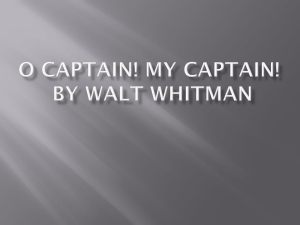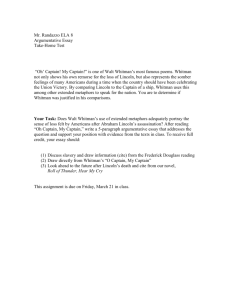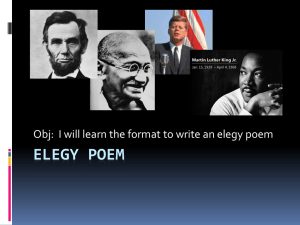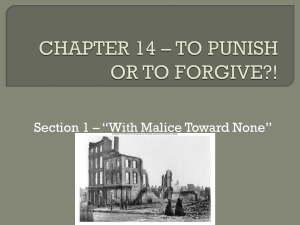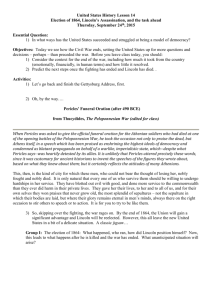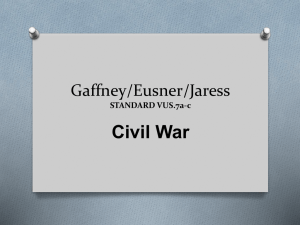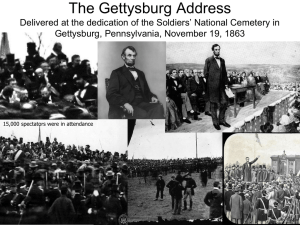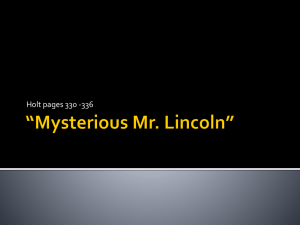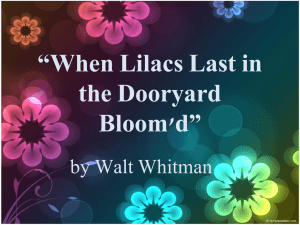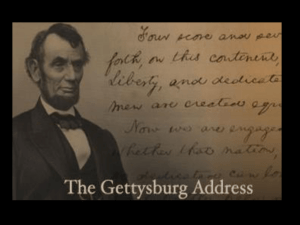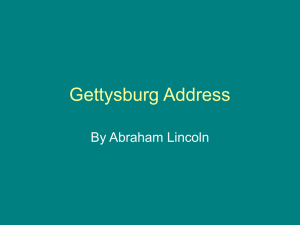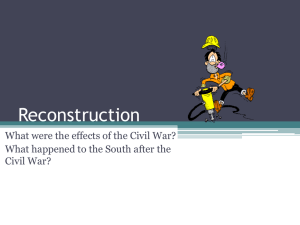The Gettysburg Address/ O Captain! My Captain!
advertisement
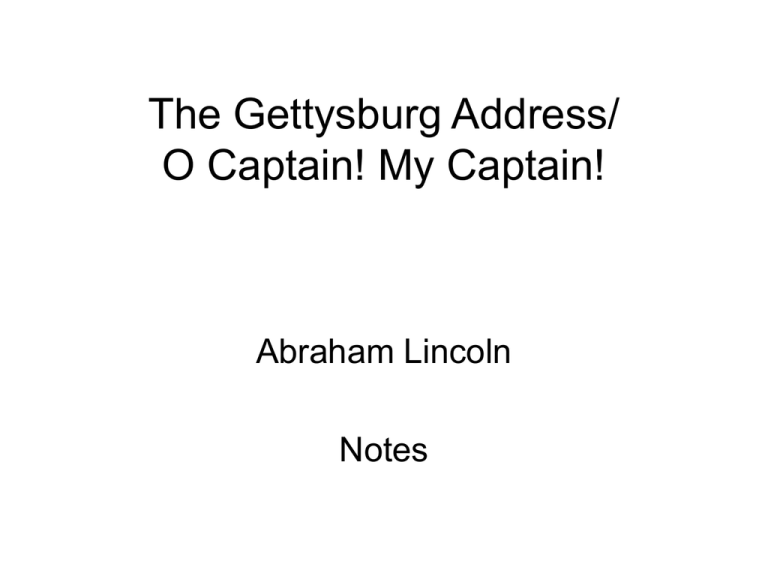
The Gettysburg Address/ O Captain! My Captain! Abraham Lincoln Notes The Gettysburg Address • How do you think the relatives of the deceased soldiers feel at this moment? • Emotions? Author’s Purpose • Despite the fact that his purpose is to dedicate a cemetery, Lincoln begins his speech with an image of birth, not death. Lincoln refers to the birth of our nation. • How does this affect the tone? Author’s Craft • Allusion - a reference, usually brief, often casual, occasionally indirect, to a person , event, or condition thought to be familiar (but sometimes actually obscure or unknown) to the reader. This holds true especially for the characters and events of mythology, legends, and history. Association is an essential part of allusion. The purpose of allusion is to bring a world of experience outside the limitations of a statement to the reader. • The term comes from Latin alludere, which means “to play with,” “jest,” or “refer to.” • What allusion is Lincoln referring to? • Why is this reference fitting! • Why, in your opinion, does Lincoln choose to emphasize that he cannot really consecrate the cemetery? • Why has Lincoln’s speech been so well remembered? O Captain! My Captain! Walt Whitman Notes Literary Elements • Elegy - a mournful, melancholy poem, especially a funeral song or lament for the dead or a personal, reflective poem. • The word comes from the Greek elegeia derived from elegos, meaning “mournful poem.” • Elegies originated in Greek and Roman literature where they were used for various subjects such as death, war, or love and were distinguished for having a specific meter, rather than for their subject matter. Since the Sixteenth Century, modern poets characterized elegies not by the form, but by the content, which was invariably melancholy and centered on death. • "Guide to Literary Terms: Elegy." eNotes: Guide to Literary Terms. Ed. Penny Satoris. Seattle: Enotes.com Inc, October 2002. 7 December 2007. <http://www.enotes.com/literary-terms/elegy>. • Metaphor - a figure of speech in which a word or phrase is applied to a person, idea, or object to which it is not literally applicable. It is an implied analogy or unstated comparison which imaginatively identifies one thing with another. This device is used by an author to turn or twist the meaning of a word. Metaphors are the most often used figure of speech. While not required in poetry, they are universally used there. A “dead metaphor” is a former metaphor now accepted as common usage, such as table leg or car hood. • The term is from the Greek metaphora, meaning “transference” which was formed by combining meta, meaning “over” and pherein, meaning “to carry.” • John Donne makes use of metaphor when he writes in Twickenham Garden: • And take my tears, which are love’s wine. • "Guide to Literary Terms: Metaphor." eNotes: Guide to Literary Terms. Ed. Penny Satoris. Seattle: Enotes.com Inc, October 2002. 7 December 2007. <http://www.enotes.com/literaryterms/metaphor>. Vocabulary • Rack—storm or jolt • Exulting—rejoicing greatly • Keel—the main timber that runs the length of a boat’s bottom; so, a steady keel is a straight, even course. Vocabulary: The Latin Root Tract • The word detract comes from the Latin prefix de-, meaning “down,” and the root tract, meaning “to drag, draw, or pull.” Lincoln said that the soldiers of Gettysburg had accomplished something beyound our powers to detract—drag down, or lessen— what they had done. • Practice: Match each word with its meaning. Use these prefixes to help you. • • • • • Ex- “out” In- “not” Re- “back” Pro- “forward” Con- “together” Match each word with its definition. 1. Contraction( n) 2. Extraction (n) 3. Intractable (adj) 4. Retraction (n) 5. Protracted (adj) a. Long and drawn out b. Something pulled out of something else c. A withdrawal, as of a promise or statement d. Something shortened or made smaller e. Unable to be guided or led; stubborn Analyzing Literature • Recall – What does Lincoln say will be most remembered about Gettysburg? What will be forgotten? – In Whitman’s poem, at what stage in the ship’s journey does its captain die? Interpret • What irony do you find in Lincoln’s comments about what the world will forget and remember? • Why does the speaker in the poem find the time of the captain’s death to be ironic and particularly sad? Evaluate • What feelings about death do these selections convey? • What does Lincoln say in his address that you find relevant to your life? Explain. • Whitman uses the terms Captain and father to refer to Lincoln. What terms, in your opinion, might a modern writer use in mourning a great leader? Explain your choices. • The Term “ship of state” was often used in earlier times to represent a nation. Contrast and compare a ship and the United States. How are they alike/ different? • Would you care if a leader you respect were a great or a poor speaker? Explain. Theme Connection • What have these selections added to your understanding of the theme “Free to Be”?
